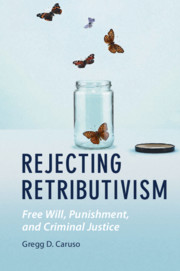Book contents
- Rejecting Retributivism
- Law and the Cognitive Sciences
- Rejecting Retributivism
- Copyright page
- Dedication
- Contents
- Acknowledgments
- 1 Free Will, Legal Punishment, and Retributivism
- 2 Free Will Skepticism
- 3 The Epistemic Argument against Retributivism
- 4 Additional Reasons for Rejecting Retributivism
- 5 Consequentialist, Educational, and Mixed Theories of Punishment
- 6 The Public Health–Quarantine Model I
- 7 The Public Health–Quarantine Model II
- 8 The Public Health–Quarantine Model III
- 9 The Public Health–Quarantine Model IV
- References
- Index
7 - The Public Health–Quarantine Model II
The Social Determinants of Health and Criminal Behavior
Published online by Cambridge University Press: 06 May 2021
- Rejecting Retributivism
- Law and the Cognitive Sciences
- Rejecting Retributivism
- Copyright page
- Dedication
- Contents
- Acknowledgments
- 1 Free Will, Legal Punishment, and Retributivism
- 2 Free Will Skepticism
- 3 The Epistemic Argument against Retributivism
- 4 Additional Reasons for Rejecting Retributivism
- 5 Consequentialist, Educational, and Mixed Theories of Punishment
- 6 The Public Health–Quarantine Model I
- 7 The Public Health–Quarantine Model II
- 8 The Public Health–Quarantine Model III
- 9 The Public Health–Quarantine Model IV
- References
- Index
Summary
In this chapter, I will further develop the public health–quarantine model by exploring the relationship between public health and safety. I will focus on how social inequalities and systemic injustices affect health outcomes and crime rates, how poverty affects incarceration rates, how offenders often have preexisting medical conditions including mental health issues, how involvement in the criminal justice system itself can lead to or worsen health and cognitive problems, how treatment and rehabilitation methods can best be employed to reduce recidivism and reintegrate offenders back into society, and how a public health approach could be successfully applied within the criminal justice system. My approach will draw on research from the health sciences, social sciences, public policy, law, psychiatry, medical ethics, epidemiology, neuroscience, and philosophy. I will argue that there are number of important links and similarities between the social determinants of health (SDH) and the social determinants of criminal behavior (SDCB), and that the public health–quarantine model provides the most justified, humane, and effective approach for addressing criminal behavior.
- Type
- Chapter
- Information
- Rejecting RetributivismFree Will, Punishment, and Criminal Justice, pp. 229 - 269Publisher: Cambridge University PressPrint publication year: 2021

